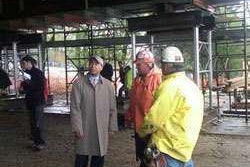UPS, FedEx and Navistar on Friday, Oct. 21, all applauded the recent approval of the free trade agreements with South Korea, Colombia and Panama as a growth mechanism for the United States.
“Robust trade will create new opportunities for American businesses to grow and add employees,” said Scott Davis, chairman and chief executive officer of the Atlanta-based company. “As a member of the President’s Export Council and leader of a business that works with companies of all sizes, I have seen firsthand how expanding the marketplace and increasing American exports will help the U.S. economy to grow and our businesses to thrive.
Davis said the bipartisan effort that led to enactment of the agreements demonstrates that government leaders can compromise to boost the U.S. economy. “These trade agreements are a major step forward since 95 percent of the world’s consumers now live outside the U.S.,” Davis continued. “But we must continue to make progress on other fronts such as transportation infrastructure investment, corporate tax reform and continued trade facilitation to ensure the U.S. remains competitive in the global marketplace.”
FedEx said the agreements will help strengthen and grow the U.S. economy. “At FedEx, we have seen firsthand the benefits from U.S. free trade agreements,” the company said. “After implementation, two-way trade between the United States and its free trade agreement partners increases, and we expand our operations and service offering to meet our customers’ growing needs.”
Navistar said the agreements will boost U.S. exports for manufacturers in the United States. “Global growth has been a key part of our strategy to build on our strong North American truck and engine businesses,” said Dee Kapur, truck group president, Navistar. “These agreements will eliminate the import taxes and tariffs applied to our products in Panama and Colombia – regions where our products lead – and create jobs in the U.S. The agreements also contain provisions requiring signatories to promptly address concerns regarding technical barriers to trade. Such arrangements are invaluable at removing impediments to trade that can arise when both parties apply divergent regulatory standards to a single product.
“Implementation of these agreements has taken more than four years of work, and we thank the U.S. Department of Commerce, the Office of the U.S. Trade Representative and the many members of the House and Senate for supporting the manufacturing industry,” added Kapur. “The National Association of Manufacturers, which has long been a leading voice for free trade, should also be recognized for its efforts in this area.”











